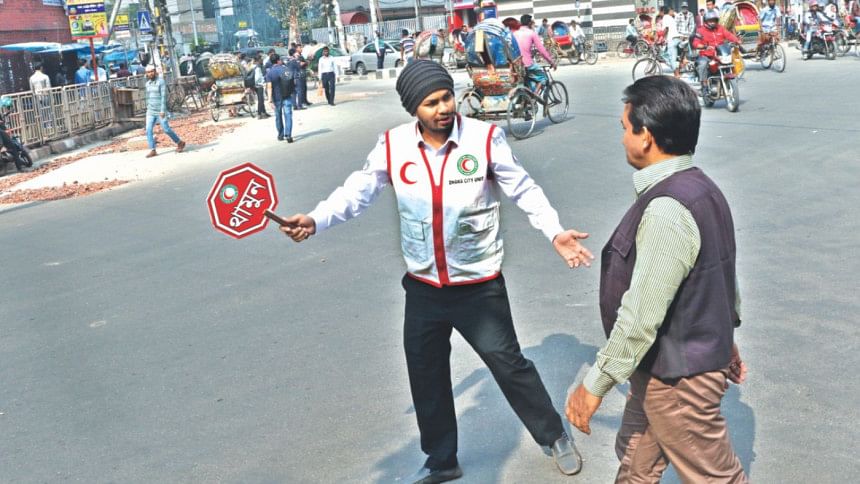Is DMP's action plan enough to fix our roads?

Apparently "inspired" by last year's safe road movement, the DMP has come up with yet another action plan to deal with Dhaka's anarchic—to put it mildly— traffic situation. According to news reports, this would include involving school and college students alongside Scout and BNCC members as volunteers on the roads, fortnightly traffic discipline programmes, increased check-posts, introduction and revamping of traffic management systems, cracking down on illegal occupancy of footpaths, and increasing use of video cases for traffic violations. Leaving the nature of this inspiration aside, the question can be asked: is this what we need for fixing Dhaka's traffic? More ad hoc measures, similar to the traffic weeks? Or does the issue cut deeper? And is the administration taking away the correct lesson from the road safety movement?
Firstly, what the movement showed was that Dhaka's roads can be made more disciplined, where lanes are maintained, where buses don't treat the entire road network as their living room, where CNGs run on metres, and ambulances are given right of way. This does not mean that the solution is to get more student volunteers. It showed the root of the problem which gave rise to this culture where breaking traffic rules is the norm. And those issues are structural and institutional. The fact that the DMP is prioritising this area is certainly a welcome step. But to translate that into something concrete requires much more: thinking more long-term, and tackling issues that are deeper than what the DMP seems to be focussed on.
Giving credit where it is due, the increased vigilance of the roads during and after last year's traffic week has given us one thing at least. Motorcycle drivers and their passengers almost always wear and carry helmets now. But what of maintaining lanes and not cutting across every street whenever there's just enough space to put the front of a vehicle into? And we have forgotten what colours stand for when it comes to traffic lights—they have been left unused for that long. Traffic policemen in some busy streets or intersections have to use ropes to make sure cars do not speed by when asked to stop, or stop on the zebra crossings because those extra few feet apparently make all the difference to these vehicles. We are nowhere closer to solving the way buses drive on the roads: bus stops and ticket counters are things we remember only from a distant past. And anyone who uses CNGs know, not only are metre-based fares not implemented, but CNG drivers themselves have to pay traffic enforcers at various intersections a few bucks to park there (just stand around the Farmgate/Ananda Cinema Hall intersection or in front of Bashundhara City for 10 minutes any day, and the sight will not escape you).
The issues that led to this situation are varied, but share common themes. Drivers, both of public transport and private, get their licences without having to go through the process of learning and proving their knowledge of traffic laws and driving skills. Ramshackle vehicles run without fitness certifications, and when they do have the certificates, the nature of how that fitness is certified remains a concern. The way VIP movements and protocols are implemented means Dhaka is gridlocked for hours. The common citizen does not see the need to respect traffic laws; when they see that these laws do not apply to the powerful, then why should the laws apply to them? If not through power of position, they want the same treatment through bribery or when they think they can get away with it. And in many cases, the DMP is hamstrung too, because how many lowly enforcers standing under the heat all day will risk his or her job trying to stop a powerful official from taking the wrong side of the road?
These are institutional problems of the regulators, enforcers and governance as a whole. These need to be solved. Yes, drives and action plans similar to the one being undertaken can help in solving short-term problems. But they need to be followed up with long-term strengthening of institutions and governance. The issue of safety needs to be incorporated into the law, and owners and management must be made responsible, not just the drivers. Respect for traffic laws will come after, and only after, the authorities can show that the law is not selective. It will be some time till the culture of breaking every law to get to one's destination a few minutes faster will change. More time till people are convinced that a car per person is not a necessity in a city the size of Dhaka. When people will maintain lanes and stop at traffic lights willingly. But that will only be possible when the administration can show that laws are not selective, and apply equally to the common citizen as much as they do to the powerful.
A few years ago, the enthusiasm with which young people started cycling was uplifting. The sale of cycles had increased and Dhaka was filled with young boys and girls cycling to class, work and just for the joy of it. That seems to be on the wane; and understandably, because cycling in Dhaka means that at any moment a motorcycle or a bus might potentially hit you trying to overtake you or drop off a passenger who wants to be dropped off at his doorstep. Cycling lanes, a pedestrian-friendly city, effective public transport—these are what will make a Dhaka that we all seem to want. And if we are to even begin imagining that Dhaka, we need to start fixing the institutions that govern the roads. Till then, measures of more cases being filed and boy Scouts urging people to use foot overbridges (and sometimes threatened or ignored for doing so) will be only partly effective, that too just for the time they are enforced. Change must start from the institutions that are bigger than the individual man who is willing to risk his life running across a busy street rather than use an overbridge five feet away.
Moyukh Mahtab is a member of the editorial team, The Daily Star.





Comments